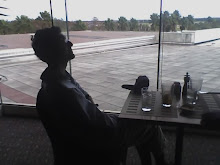They are a group of likable stars who have kept audiences entertained night after night. Now they are coming back, a little bit older, and there are questions about whether they can keep up the same level of success. And this week marks their sternest test yet.
I'm actually talking about two groups -- the Big Three of Ray Allen, Kevin Garnett and Paul Pierce on the Boston Celtics, and the Big Four of Carrie Bradshaw, Samantha Jones, Miranda Hobbes and Charlotte York Goldenblatt on "Sex and the City." The Celtics' Big Three must hang on to win their NBA playoff series against the Orlando Magic, while the Big Four must show they can still command box-office mojo with "Sex and the City 2" opening this week.
The Big Three have the tougher task. After a meteoric 3-0 start to their series against Orlando, the Celtics suddenly look as old and broken-down as they did during the regular season. The Magic and their young star, Dwight Howard, have won the last two games, including a deflating 113-92 decision Wednesday. Now the Big Three need to step up, especially since their teammates have been shaken up, like Glen "Big Baby" Davis and Rasheed Wallace. If the old guard falters in Game Six tonight, Boston faces a potential double humiliation: A second straight pro sports team winning the first three games of a playoff series ... and then getting eliminated by losing the next four. (This unlikely scenario already befell the Bruins this month.)
Meanwhile, the Big Four (their real names are Sarah Jessica Parker, Kim Cattrall, Cynthia Nixon and Kristin Davis) have opened their new movie to scathing reviews. The New York Post slammed the film for such elements as having Liza Minnelli sing "Single Ladies" at a gay wedding, and denounced the decision to set the movie in anti-feminist Abu Dhabi. The New York Times groused that "the movie itself, and perhaps the culture it stands in for, has lost interest and can’t figure out what to do with them as they tiptoe toward middle age."
Age before beauty, the saying went ... but in the youth-obsessed United States, the motto has reversed itself. Americans want their icons to be young and hip, like the Magic's 24-year-old Dwight Howard. As the Times noted of Manhattan, the location of the SATC TV series and first movie, "the party girls of yesteryear are tomorrow’s Ladies Who Lunch." And yet perhaps we should say that there is beauty in age, and that age is beauty. There is something inspiring in seeing the guys or girls we grew up watching continue their craft on the court or on the screen.
"I'm not as good as I once was," old-timer Toby Keith crooned. "But I'm as good once as I ever was." Whether the Big Three win or lose, whether the Big Four impress or flop, they deserve kudos for showing us how to age gracefully and have fun along the way.
Showing posts with label movies. Show all posts
Showing posts with label movies. Show all posts
Friday, May 28, 2010
Monday, October 26, 2009
Moore exposes vacancy of capitalist system
Michael Moore's new movie, "Capitalism: A Love Story," drew applause from the viewers at the Kendall Square Cinema Sunday night. Despite the note of guarded optimism at the end, most of the scenes in the film were hardly cause to cheer. A family burning their possessions after getting evicted from their home in Peoria, Ill. ... blue-chip companies cashing in on life-insurance policies when their employees die ... a window worker in Chicago choking up when he and his colleagues lose their jobs when the company folds ...
Like a latter-day Dickens, Moore shows us the inhumane side of capitalism, and the very visible damage that the invisible hand of Adam Smith has wrought lately. It's perversely appropriate that the front page of the Boston Metro Monday morning is devoted to an auction of abandoned property in Detroit -- an amount "so massive it would fill all of the Hub."
Moore reveals the human faces beyond the statistics (including his own father, who discusses the better days of Detroit's auto industry), and while the New York Times criticized him for being short on solutions, he shows several examples of communities coming together to fight for the victims of capitalism in Chicago and Florida. At times the film seems longer than its two-hour, six-minute length, and at times it ignores history (Moore fusses over the crossover between Goldman Sachs and the Treasury Department but doesn't mention the tradition of such crossovers, as was the case with former Treasury boss/plutocrat Andrew Mellon in the early 20th century).
Still, Moore deserves praise for another timely expose, this one of the timeless problem of human greed.
Like a latter-day Dickens, Moore shows us the inhumane side of capitalism, and the very visible damage that the invisible hand of Adam Smith has wrought lately. It's perversely appropriate that the front page of the Boston Metro Monday morning is devoted to an auction of abandoned property in Detroit -- an amount "so massive it would fill all of the Hub."
Moore reveals the human faces beyond the statistics (including his own father, who discusses the better days of Detroit's auto industry), and while the New York Times criticized him for being short on solutions, he shows several examples of communities coming together to fight for the victims of capitalism in Chicago and Florida. At times the film seems longer than its two-hour, six-minute length, and at times it ignores history (Moore fusses over the crossover between Goldman Sachs and the Treasury Department but doesn't mention the tradition of such crossovers, as was the case with former Treasury boss/plutocrat Andrew Mellon in the early 20th century).
Still, Moore deserves praise for another timely expose, this one of the timeless problem of human greed.
Subscribe to:
Posts (Atom)



